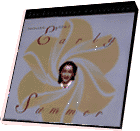

Japan drama
1951
bw 135 min.
Director: Yasujiro Ozu
CAV: $69.95 - available
2 discs, catalog # CC1483L
VHS: available from Home Vision Cinema
Early Summer, directed by Yasujiro Ozu (19031963), is one of the filmmaker's most absorbing and poignant dramas. The movie resonates with the rhythms and contradictions of modern Japanese life, the conflict between giri (duty) and ninjo (human feeling), and the meaning of tradition in postwar Japan.
The film is a complex personal story, involving three generations of the Mamiya family, which consists of the grandparents, Shukichi Mamiya (Ichiro Sugai) and his wife Shige (Chieko Higashiyama); their son Koichi (Chishu Ryu), a doctor who is married, with two sons; and their unmarried daughter Noriko (Setsuko Hara), a secretary. The family has settled into a contented life after the loss of another son, Shoji, during World War II, but now faces a new problem‹Noriko is 28 years old and must soon marry. Her parents, brother, employer, friends, and neighbors all seek to help her choose potential husbands, none of whom is acceptable. Noriko makes her choice independently of all of them, selecting Yabe, Koichi's assistant, but the family objects because he is a widower with a daughter from his previous marriage. Noriko's marriage also means that she must move to Akita, where Yabe is assigned to a hospital. The loss of her contribution to the household income forces the breakup of the Mamiya family, as her parents go to live with Shukichi's brother in the distant city of Yamato.
The crumbling of the traditions that have guided Japanese life was a favorite subject of Ozu's. The war and its aftermath, as a disruptive influence on the family, quietly permeates the entire film and the action. Noriko and her independent nature represents the kind of ³impudent² woman that her brother Koichi constantly complains about, having found them too common since the war; the loss of Shoji is a source of grief that the grandparents have scarcely recovered from; and Noriko's choice of Yabe, Shoji's best friend, is, in some respects, her way of honoring his memory. It is also an unacceptable choice under a different set of social rules, however, which she must break‹and in breaking those rules and traditions, she shatters the unity of the family.
Early Summer is a beguilingly lyrical, exquisitely nuanced movie. Its substance lies in the textures of Japanese life captured in Ozu's cinematic prism. His use of cinematic devices is very quiet and subtle‹his camera is, as usual, relatively sedate, with much of the action seen from the point of view of the tatami shot (in which the camera is three feet off the ground, perfect for catching the facial expressions of kneeling characters); but his use of audio cues to bridge and link scenes‹such as the sound of the kabuki performance which moves from the theater to the radio between two shots, and the sliding door that's transformed into a roar of train wheels‹echos the best Hollywood thrillers.
Scholar David Bordwell has compared it to one of Hollywood's most renowned wartime family stories, Vincente Minnelli's Meet Me In St. Louis (1944), although Ozu's work lacks the distractions of Technicolor, trolley songs, and oppressively cute children. One can also find antecedents in the best dramatic work of John Ford (The Grapes of Wrath, The Sun Shines Bright) and Leo McCarey (Make Way For Tomorrow). It is one of Ozu's most moving and involving films, and one of his most enduring classics.
-- Bruce Eder
Bruce Eder is a film historian and a frequent contributor to Criterion Collection audio commentary tracks.




